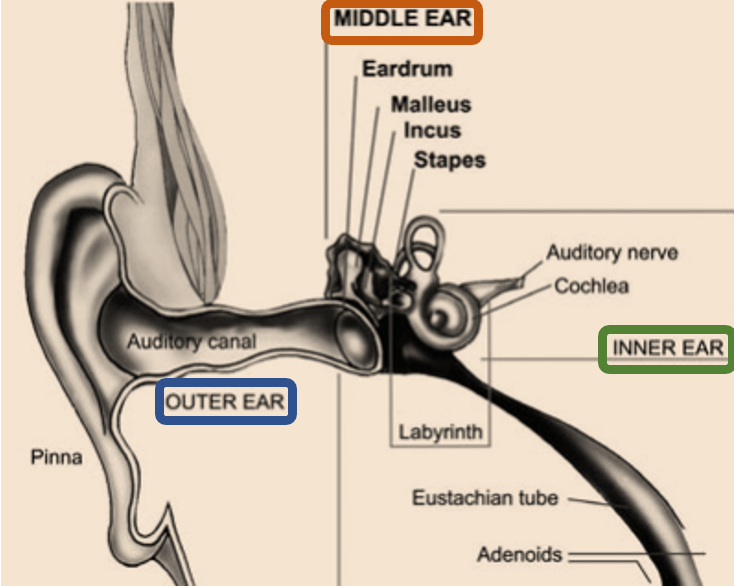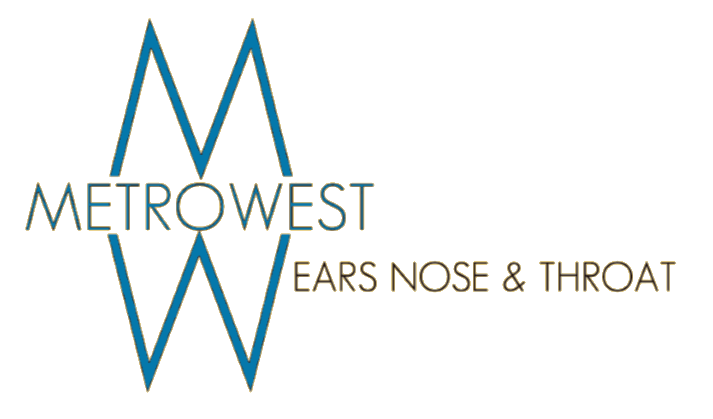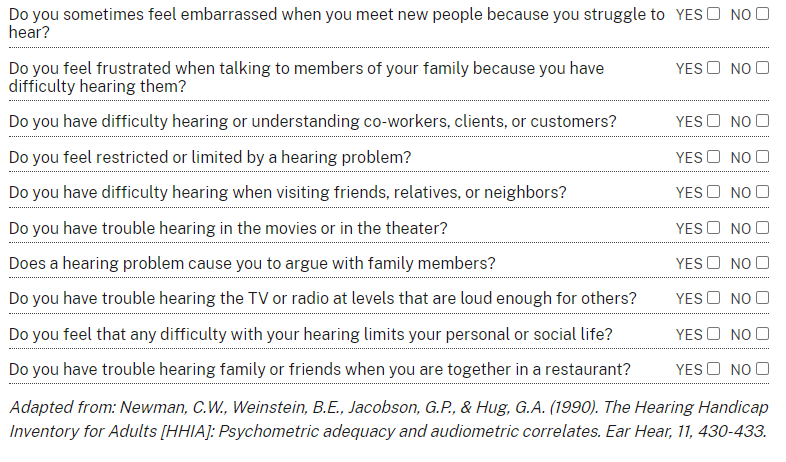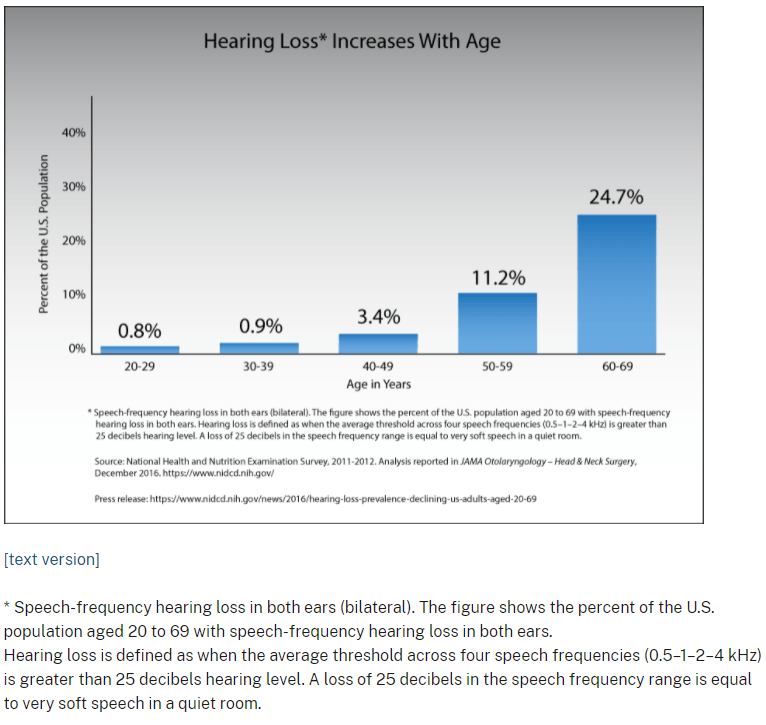HEARING LOSS
What is hearing loss?
Difficulty perceiving sounds in our environment, or hearing loss, is an extremely common condition affecting millions of adults and children living in the U.S. In fact, nearly 2 to 3 out of every 1000 children are born with a detectable level of hearing loss in at least one ear (5). The rates of hearing loss continue to increase with age. Disabling hearing loss occurs in 8.5 percent of adults aged 55 to 64, in 25 percent of adults aged 65 to 74, and in 50 percent of adults aged 75 and over (4).
For those of us experiencing hearing loss, or who have a loved one with hearing loss, we can understand what a unique set of challenges this poses. Communication often becomes a frustrating experience. Participating in work, social engagements, and even simple activities like watching television can become challenging. In infants and children with hearing loss, there can also be significant delays in speech and language development. Hearing loss can affect many aspects of our lives, and is an important symptom to bring to the attention of your healthcare provider.
Because there are so many potential causes of hearing loss, it is very important to have a thorough examination of your ears and auditory system. Some causes are treatable, and may result in only a temporary hearing loss. Other causes are more permanent, and may require more long-term treatment options like hearing aids, surgery or cochlear implants.
In order to understand hearing loss, it is first important to understand how our hearing system works. Please refer to the video below, courtesy of the National Institute of Deafness and Communication Disorders, for a brief overview of the auditory system.
How do I know if I have hearing loss?
The symptoms of hearing loss can often be subtle, and can go undetected for several years. Individuals with hearing loss may notice that they may miss parts of conversations with loved ones or colleagues. Some may find that they are turning up the volume on their TV or radio. Certain social situations may even become unenjoyable or embarrassing, as a result of these communication barriers. The presence of other ear symptoms, such as pain, ringing, or dizziness, may also suggest issues with hearing health.
If you are curious, fill out this simple questionnaire below. If you answer “yes” to 3 or more of the questions, you may have a hearing problem and may need to discuss future steps with your healthcare provider.
How do you diagnose hearing loss?
If you suspect you may have hearing loss, it is important to have yourself evaluated by a medical or hearing professional. In many instances, you will be referred to an otolaryngologist (also known as an ENT) for further care. An otolaryngologist is a doctor that specializes in caring for a range of issues, which includes ear and hearing problems.
During your evaluation, your doctor will carefully listen to your symptoms and ask relevant questions. This will be followed by an examination of your ears, which can sometimes identify the cause of your hearing loss. For example, your doctor may see build-up of excessive wax, evidence of an ongoing ear infection, issues with your ear drum or hearing bones, or evidence of dysfunctional eustachian tubes.
Your physical exam is generally followed by an audiologic exam, commonly referred to as a “hearing test”. These tests are carried out by healthcare professionals known as audiologists, who have had extensive training in how to properly evaluate and measure hearing problems. They assess various parts of your hearing function, including: how well you hear at different frequencies, how well you can identify spoken words, whether your ear drum moves normally, and if the pressure behind your ear drum is normal. Our audiologists are equipped to assess hearing function for all age groups.
Often, at this point, your doctor can provide you with a diagnosis for your symptoms and you can start to discuss treatment options. In some instances, however, further testing may be necessary.
What are common causes of hearing loss?
Many causes of hearing loss exist, which is why a thorough ear and audiologic exam is important in establishing a diagnosis. While some causes are reversible or treatable, others may result in longterm hearing impairment. Problems may arise in the outer ear (pinna, ear canal), in the middle ear (ear drum, hearing bones, eustachian tube), or in the inner ear (hearing nerve, cochlea). Look below for a list of some common causes of hearing loss.

Source: Modified from NIH/NIDCD
Outer Ear (pinna, ear canal): Otitis externa (infection of the ear canal or pinna), excessive wax accumulation, obstructive masses in the ear canal (aural polyp, exostoses, osteoma), foreign body in the ear
Middle Ear (ear drum, hearing bones, eustachian tube): Perforation or hole of the ear drum, tympanosclerosis (or scarring of the ear drum), fluid in the middle ear space, erosion or fixation of the hearing bones, dysfunction of the eustachian tube, masses or cysts in the middle ear space
Inner Ear (hearing nerve, cochlea): Age-related hearing loss, noise-induced hearing loss, viral infection of the inner ear, genetic causes of hearing loss, immune-mediated inner ear disease, benign tumors of the hearing nerve, inner ear malformations
How do you treat hearing loss?
The treatment for hearing loss varies widely from person to person, as it depends on the underlying cause. A problem like excessive wax build-up can often be easily treated in the office. If, however, an ear infection is diagnosed, you may need to be treated with either oral or topical medications. Some ear problems may need to be treated with a procedure (either in the office or in the operating room). And in some cases, your doctor may recommend a trial with hearing aids to correct an underlying hearing problem.
Keep in mind, each person has a unique set of ear problems, and your doctor will discuss the best treatment options for you based on your exam, testing results, and preferences.
How do I protect my ears from noise?
It’s a noisy world out there! Excessive or prolonged noise exposure can cause permanent damage to our hearing. It is very important for us to be aware of this issue, and take precautions whenever possible. Several factors can affect the degree of noise damage to our ears:
- Intensity of the sound (in decibel levels)
- Duration of exposure to the sound
- Distance from the sound
- Genetics (some of us are just more susceptible to noise-induced hearing loss than others)
In general, sounds under 70 decibels are considered safe. Any sound over 85 decibels can potentially cause irreversible hearing loss. Keep in mind, even common activities like listening to our headphones can reach decibel levels above this threshold. Whenever possible, we must remember to:
- Decrease the volume
- Move away from the sound
- Wear hearing protectors (see videos below for how to properly use hearing protectors)
To learn more about how to protect our ears from noise, follow this link: Noisy Planet (nih.gov)
Why is hearing health important?
Hearing loss can have far-reaching effects on our quality of life. We may find it more difficult to engage in conversations with loved ones, listen to the TV or radio, participate in work, hear our phones or alarms ring, etc. As it becomes harder to engage with the world around us, we may find ourselves more and more socially isolated. In this way, hearing loss can affect multiple aspects of emotional, cognitive, and physical health. Here are some of the ways in which hearing loss loss can affect our lives:
Depression: A recent review was completed of 35 studies, encompassing over 140,000 participants. This showed that, in older adults, the presence of hearing loss was associated with significantly greater odds of depression (2).
Cognitive Decline & Dementia: The link between hearing loss and cognitive function has long been established, though the exact nature of the relationship is still being actively researched. In a recently published study between the Johns Hopkins School of Medicine and the National Institute of Aging, it was found that the rate of dementia increased as the severity of hearing loss increased (3). In individuals with mild, moderate, and severe hearing loss, the odds of associated dementia increased by roughly 2-, 3- and 5-fold.
Falls: In a review of 12 published studies, the odds of falling were roughly 2.39 greater in adults with hearing loss versus adults with normal hearing (1).
Despite the clear importance of our hearing health, many people still go untreated for this problem. It is estimated that, of all adults over 70 years of age who could benefit from hearing aids, only 30% have ever used them. If you are concerned about your hearing, we urge you to discuss further with your healthcare provider or call our office for an appointment.
References
- Jiam, N. T., Li, C., & Agrawal, Y. (2016 Nov). Hearing loss and falls: A systematic review and meta-analysis. Laryngoscope, 126(11):2587-2596.
- Lawrence, B. J., Jayakody, D. M., Bennett, R. J., Eikelboom, R. H., Gasson, N., & Friedland, P. L. (2020 Apr 2). Hearing Loss and Depression in Older Adults: A Systematic Review and Meta-Analysis. Gerontologist, 60(3):e137-e154.
- Lin, F. R., Metter, J. E., O'Brien, R. J., Resnick, S. M., Zonderman, A. B., & Ferrucci, L. (2011 Feb). Hearing Loss and Incident Dementia. Arch Neurol, 214-220.
- National Institute of Deafness and Other Communication Disorders. (2021, October 28). Quite Statistics About Hearing. Retrieved from https://www.nidcd.nih.gov/health/statistics/quick-statistics-hearing
- Prevention, C. f. (59(8)). Identifying infants with hearing loss - United States, 1999-2007. MMWR Morb Mortal Wkly Rep, 220-223.








